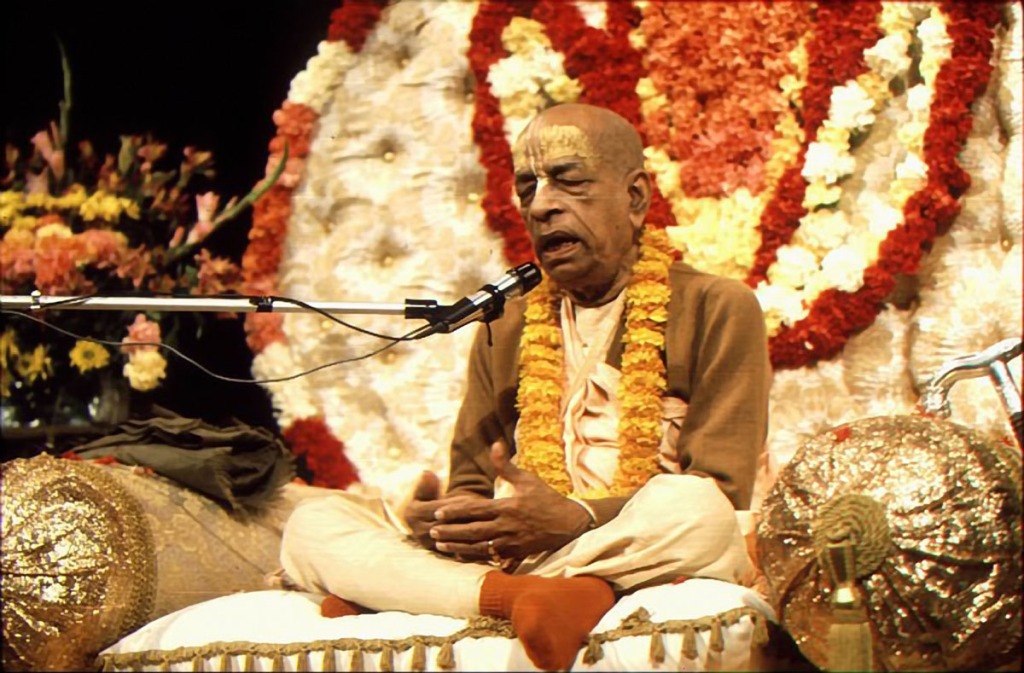By His Holiness Satsvarupa dāsa Gosvāmi
Prabhupāda and his disciples were enroute to Indore, a city of 475,000 in the central Indian province of Madhya Pradesh, thirteen hours northeast of Bombay. The directors of the Gītā Jayanti Mahotsava, a festival to celebrate the teachings of Bhagavad-gītā, had invited Prabhupāda and his disciples to attend their convention and public meeting.
In Indore Srila Prabhupāda and his disciples settled into their quarters near the Gītā Bhavan, the site of the Gītā Jayanti Mahotsava. The directors of the convention had assigned Prabhupāda a bungalow with a lawn and garden and had provided nearby facilities for his disciples.
The devotees toured the grounds of the Gītā Bhavan, noting the many swamis and sādhus who had arrived from various parts of India for the Mahotsava. They saw the large paṇḍāl and stage, the eye hospital run by the Gītā Bhavan, and the diorama exhibit. The diorama exhibit they regarded as the kind of eclectic mixing of spiritual paths that Prabhupāda often referred to as “hodgepodge.” Krishna, Buddha, Jesus, Vivekananda, Ramakrishna, and demigods and animals were all on display. While admiring the energy and imagination that had produced such an exhibit, the devotees questioned the benefit of such a conglomeration.
On the first night of the festival Prabhupāda was scheduled as the last speaker. His disciples, who sat with him onstage, grew bored and restless from the ordeal of so many hours of Hindi speeches. And knowing that these speakers were presenting Māyāvāda misconceptions made the evening especially painful. Srila Prabhupāda sat sternly and waited, his hand in his bead bag, his head held high, his lips murmuring the Hare Krishna mantra.

When Prabhupāda finally spoke, he began by explaining that in the West he was spreading the teachings of the Gītā as it is. Bhagavad-gītā, he said, could be properly understood only in disciplic succession, just as Arjuna, the original student of the Bhagavad-gītā, had understood it. The Gītā was for the devotee of Krishna and should not be misinterpreted by nondevotees. To misinterpret the Gītā, he said, was to cheat in the name of religion. He also spoke strongly against pseudo-incarnations.
Prabhupāda concluded his talk and asked his disciples to begin kīrtana. It was an ecstatic, spontaneous event, and Prabhupāda began dancing onstage along with his disciples. The crowd came to life and began clapping rhythmically. Haṁsadūta jumped down from the stage, still playing mr̥daṇga, and began inducing members of the audience to join in chanting and dancing. Several other devotees also jumped down, and soon hundreds of people had risen to their feet, swaying, clapping, and singing: Hare Krishna, Hare Krishna, Krishna Krishna, Hare Hare/ Hare Rāma, Hare Rāma, Rāma Rāma, Hare Hare. This was the real Gītā Jayanti Mahotsava. The holy name of Krishna was being sung, and everyone was happily united in the kīrtana.
Greatly pleased by the performance of Prabhupāda and his disciples, the paṇḍāl directors visited Prabhupāda the next day in his bungalow. Prabhupāda complained at having to wait so long before he could speak; his disciples shouldn’t be required to sit through hours of speeches in a language they couldn’t understand. When Prabhupāda intimated that the speeches seriously deviated from the teachings of the Gītā, the director of the Gītā Bhavan replied, “We do not favor any particular way. Followers of the Śankara school and others also come to our institution. We do not subscribe wholly that Śrī Krishna is the sole God or anything of the sort. There is a power behind Him…”
This remark drew fire from Srila Prabhupāda . What kind of glorification of the Gītā was this if the speakers did not accept Krishna as He is explained in the Gītā? The Gītā declares Krishna to be the highest truth: mattaḥ parataraṁ nānyat. Prabhupāda advised the directors of the Gītā Bhavan to try to understand the meaning of Bhagavad-gītā. The directors did not change their opinion, but they were intelligent enough to see that Prabhupāda was a great paṇḍita and saint, and they listened respectfully. Nodding, they said they accepted his point of view.
After the men left, Prabhupāda continued, “They are thinking that there is something beyond Krishna or that it is the spirit within Krishna that we have to surrender to. But they do not know that the within and the without of Krishna are all absolute, eternal, and full of bliss.”
Prabhupāda said he could see that the organizers of the Gītā Jayanti Mahotsava had invited him to draw larger crowds. But they would not make him sit again through all the Māyāvādī nonsense, he said. From now on, he would go with his disciples, speak, chant, and then leave.
The next night, however, despite promises by the paṇḍāl directors, Srila Prabhupāda again had to wait until the end of the program before he could speak and hold kīrtana. This night, the crowd was larger than before, and they were clearly waiting for Srila Prabhupāda and the foreign sādhus. When Prabhupāda’s turn came at last, he spoke and then asked his disciples to begin kīrtana.
During the kīrtana one of the members of the Gītā Bhavan gestured to the devotees to jump down into the crowd as they had done on the preceding night. But what had been a spontaneous event the night before could not be artificially staged simply as a crowd pleaser. The man, however, was insistent. He came forward to the edge of the stage, reached up, and began grabbing at the feet of the dancing devotees, trying to pull them into the audience. The devotees became annoyed. Grabbing indiscriminately, the man pulled at one of the women’s sārīs. Srila Prabhupāda was also dancing, but when he saw this he rushed to the edge of the stage, swinging his karatālas toward the man’s face and shouting, “Stop this!” The man retreated, and Prabhupāda and his disciples continued their kīrtana. Although little-noticed by the crowd, Prabhupāda burst of lion-like ferocity had amazed his disciples. Continue reading →








